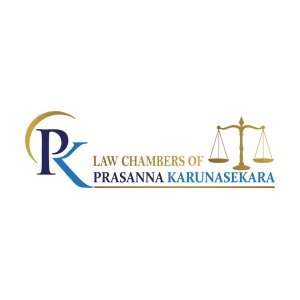Best Commercial Real Estate Lawyers in Kiribathgoda
Share your needs with us, get contacted by law firms.
Free. Takes 2 min.
Free Guide to Hiring a Real Estate Lawyer
List of the best lawyers in Kiribathgoda, Sri Lanka
About Commercial Real Estate Law in Kiribathgoda, Sri Lanka
Commercial real estate law in Kiribathgoda, Sri Lanka, covers a broad set of activities related to real estate transactions for commercial purposes. These activities encompass the buying, selling, leasing, and renting of properties used for business activities. Hence, the legal dimensions include not only transaction legality but also compliance with zoning laws, property valuation, and dispute resolutions.
Why You May Need a Lawyer
Engaging a lawyer becomes crucial in the following situations:
1. Lease agreements: If you are negotiating a lease for a commercial property, a lawyer can ensure the terms are fair and protect your interests.
2. Property purchase: A lawyer can help review the sales contracts, check for any legal issues and ensure the transaction is legally compliant.
3. Dispute resolution: In cases of disputes over commercial property, a lawyer can represent your interests and seek a favourable resolution.
4. Zoning and land use issues: If you need to get a property rezoned for your business, a lawyer who is familiar with local law can provide invaluable assistance.
Local Laws Overview
Understanding local laws when involved in commercial real estate in Kiribathgoda is vital. Key aspects to consider include:
1. Property Transfers: Sri Lankan law is stringent about the ownership transfers of real estate. The deeds must be thoroughly reviewed and recorded properly.
2. Tax Regulations: There are various tax implications associated with buying, selling and meeting annual property taxes.
3. Lease Agreements: Sri Lankan law offers protections for both landlords and tenants, but professional advice can ensure the lease is legally sound and fair.
Frequently Asked Questions
1. What are the steps associated with buying a commercial property in Sri Lanka?
The steps involve searching for a suitable property, negotiation of terms, conducting a legal search, signing of the sales agreement, payment, and transferring of the deed.
2. Is foreign investment in property allowed in Sri Lanka?
Yes, foreign investment is allowed in Sri Lanka, but there are certain restrictions that apply and a lawyer can adequately guide you through these procedures.
3. Do I need to hire a local lawyer for property disputes?
It's often best to hire a local lawyer as they are familiar with local laws and the dynamics of the local judicial system.
4. How important are local zoning laws for commercial properties?
Local zoning laws are extremely important. They dictate how a property can be used.
5. Are there any taxes on leasing a commercial property?
Yes, lease tax at 4% of total rental/value is imposed on any lease agreement of immovable property in Sri Lanka.
Additional Resources
A few resources you can consult for legal advice are the Department of Government and Information, the Sri Lanka Law Reports, and the Bar Association of Sri Lanka. These organizations often have resources or contacts that can provide legal assistance.
Next Steps
Once you have sufficient basic knowledge about commercial real estate, the best course of action is to hire a local attorney who specializes in commercial real estate. They can guide you through the process, ensure legal compliance, and protect your interests at every stage.
Lawzana helps you find the best lawyers and law firms in Kiribathgoda through a curated and pre-screened list of qualified legal professionals. Our platform offers rankings and detailed profiles of attorneys and law firms, allowing you to compare based on practice areas, including Commercial Real Estate, experience, and client feedback.
Each profile includes a description of the firm's areas of practice, client reviews, team members and partners, year of establishment, spoken languages, office locations, contact information, social media presence, and any published articles or resources. Most firms on our platform speak English and are experienced in both local and international legal matters.
Get a quote from top-rated law firms in Kiribathgoda, Sri Lanka — quickly, securely, and without unnecessary hassle.
Disclaimer:
The information provided on this page is for general informational purposes only and does not constitute legal advice. While we strive to ensure the accuracy and relevance of the content, legal information may change over time, and interpretations of the law can vary. You should always consult with a qualified legal professional for advice specific to your situation.
We disclaim all liability for actions taken or not taken based on the content of this page. If you believe any information is incorrect or outdated, please contact us, and we will review and update it where appropriate.








